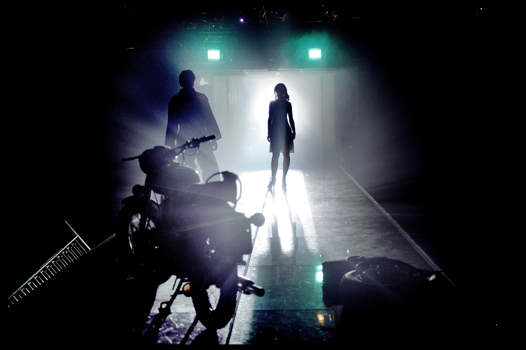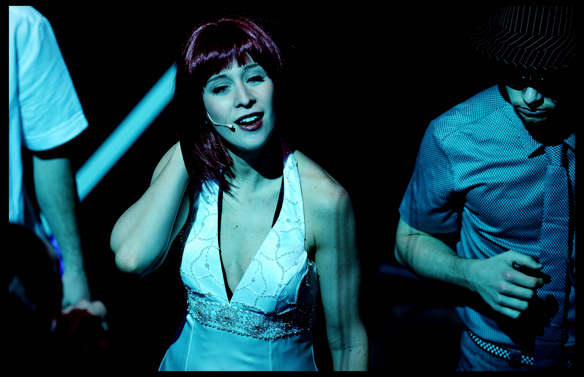Other Links
Editorial Board
- Editor - Bill Kenny
- London Editor-Melanie Eskenazi
- Founder - Len Mullenger
Google Site Search
SEEN
AND HEARD OPERA REVIEW
Olga
Neuwirth, Lost Highway:
A music-theatre piece by Olga
Neuwirth based on the film by David Lynch and Barry Gifford. ENO
at the Young Vic, London 4.4.2008 (AO)
David Lynch’s film is only a starting point for Olga Neuwirth’s
Lost Highway and even a Lynch film is one dimensional, in the
sense that it appears on a screen, and you can switch off or walk
away. Neuwirth’s work is far more unsettling because the audience
is drawn into the events on many levels. The stage runs down the
middle of the hall so you see across to other members of the
audience, “behind” the action. Mechanics like rafters and pulleys
are visible above you, your eye drawn towards them by screen
projections and off stage singing. You can’t remain passive and
detached in a work like this. I’m not even sure whether, in a
conventional sense, I liked it or not but the ideas it provokes
are still percolating in my mind. So, no easy reactions from me.
Lost Highway is unsettling, but it’s well thought through:
it provokes a lot of ideas which continue to operate long after
the show ends.
It is interesting to see how Neuwirth, Jelinek and Paulus define
Renee/Alice, the only female singing part. Valerie MacCarthy sings
both parts who seem, on the surface, to be different characters.
In fact they both not really women at all, but templates onto
which Lynch projected his male fantasies of femmes fatales, a sort
of post modern Lulu. MacCarthy has to strip off literally as well
as figuratively. Like the Mystery Man and Mr Eddy, her roles
exist in layers, but unlike them, their surfaces don’t crack in
the music. Parallel to the actor Andy (Raphael Sacks), there’s
another Andy, David Sheppard, who sings invisibly off stage.
Neuwith uses one person for two roles and two people for one, but
this is very important to the shape shifting duality of the work.
At one point, there’s a countertenor trio in which Robson, Moss
and Sheppard are positioned high up in the ceiling. Their eerie
chorus is surprisingly moving as it rings out high and clear in
indeterminate space.
Libretto: Elfriede Jelinek and Olga Neuwirth
Director : Diane Paulus
Cast:
Renee/Alice : Valerie McCarthy
Fred Madison : Mark Bonner
Mystery Man : Christopher Robson
Detectives : Andrew Playfoot, Alisdair Simpson
Andy : Raphael Sacks, David Sheppard
Pete Dayton Quirijn de Lang
Mr Eddy/Dick Laurent : David Moss
Other roles : Andrew Bone, Andrew Morton, Spencer Cummins, Craig
Heyworth, Rae Baker, Jeshua Dreyfus.
Members of the Orchestra at English National Opera, Baldur
Brönnimann, conductor

If the symbols are sinister and quite unsavoury for the audience,
what must they be like for performers? Ironically, I
imagine that Lost Highway must be hugely cathartic. It
must be like participating in a psychodrama workshop, confronting
one’s inner demons and preconceptions. Imagine what it must be
like to put yourself into The Mystery Man ? He’s sinister, like a
bloated corpse, yet is he evil ? Christopher Robson acts out the
menace in the part, but his singing is by turns sensually luscious
and terrifying. The countertenor voice ranges high above normal
conversation, so defies convention. It’s wonderful for expressing
complex things and mystery. No wonder it inspires so many
modern composers. Similarly, what must it be like to create Mr
Eddy, the mafia boss with a malevolent authoritarian persona?
Neuwirth builds strain into the lines, so when threatened, Mr
Eddy’s voice seems to shatter. His bullying is shallow bluff,
that’s why he needs his bodyguards to shore him up. David Moss,
calls himself “an extreme vocalist” because he has a range of 4½
octaves, but more significantly, he has unusual emotional range,
for he also composes, acts and stretches the boundaries of
theatre. Perhaps Moss will create for our generation a new version
of the almost unperformable Henze Versuch über Schweine. Mr
Eddy isn’t quite as demanding, but Moss negotiates the demented
Sprechgesang-like inflections in the vocal line, where high
pitched shrieks suddenly burst out of relative normality. I hate
to think how Neuwirth and Moss would have created the bully in
Lynch’s Blue Velvet.

Neuwirth’s Lost Highway is
more sophisticated than the film original because of the quality
of the music. It was inventive and tantalising. Quotes from jazz
and pop amplifiy details, but Neuwirth has too much integrity to
wallow in pastiche. This is distinctive music where sounds twist
and smear, and make uncanny changes of direction. Although the
instrumentation is spartan, there are in fact two orchestras, one
live, one recorded, and a secondary conductor (Stephen Higgins)
so the concept of duality runs through the music as powerfully as
through the acting. The orchestra is also clearly visible, its
presence shadowing what happens on stage. This is more than
background or commentary. The orchestra operates like a larger
Mystery Man, insinuating its way past the barriers that separate
music and acting, breaking down the “defence mechanisms” between
them. Every now and then, a soloist will break cover and
interject over the singers and actors. This also reflects the
vocal lines with their sudden peaks and descents.
Everyone who goes to Lost Highway will get something
different from it, and some will discover more than others. Lynch’s images
pertain to a specific social situation, while the existential
anomie that Neuwirth fathoms could exist in any time or place. The
danger is that audiences might connect too strongly to the outward
symbols rather than seeing further. For example, the car which
“drives” across the desert in the end, or seems to. This is
classic B movie schlock, but in Neuwirth, it connects with the
recurring sense of being trapped. Fred seems to get out of his
Perspex prison, but where does he go ? Alice and Andy think they
can just drive away from their problems, but their car has no
engine. And of course, it’s disturbing. Some people respond well
to this; one man in the audience told me, “It’s like facing your
insecurities”. That’s profoundly intuitive, and good for him but many people can’t cope with such things. Still, there is so much in
Lost Highway that it is worth making the effort of engaging
with its mysteries.
Best of all though, it’s good to see ENO finding its audacious,
innovative soul again. Like or dislike Lost Highway, it is
a challenging piece which can stimulate and provoke thought in
deeper sense than, say, a West End type musical. There’s so much
talk these days about what could be done to expand opera
audiences. Lost Highway may seem scary but it is actually
very good work indeed because it’s so well thought through.
Beyond the trendy “movies” image this is serious work indeed and
there are always audiences who respond to good quality, whatever form it
may take. Dumbing-down attracts dumb audiences, and this audience
was anything but that. In fact, part of the pleasure was talking
to people after the performance. They were fired up, eagerly
discussing the work on a deeply intuitive level. Whatever the
sales for Lost Highway may be, it does show that there is
an audience for intelligent, work, if it’s well marketed. So
the higher that ENO aims, it’s quite possible audiences will follow.
On my way to the Young Vic, I took a taxi. The driver asked what
was on, so I told him. “Wow, I got to go !” he said.
Back
to Top
Cumulative Index Page
